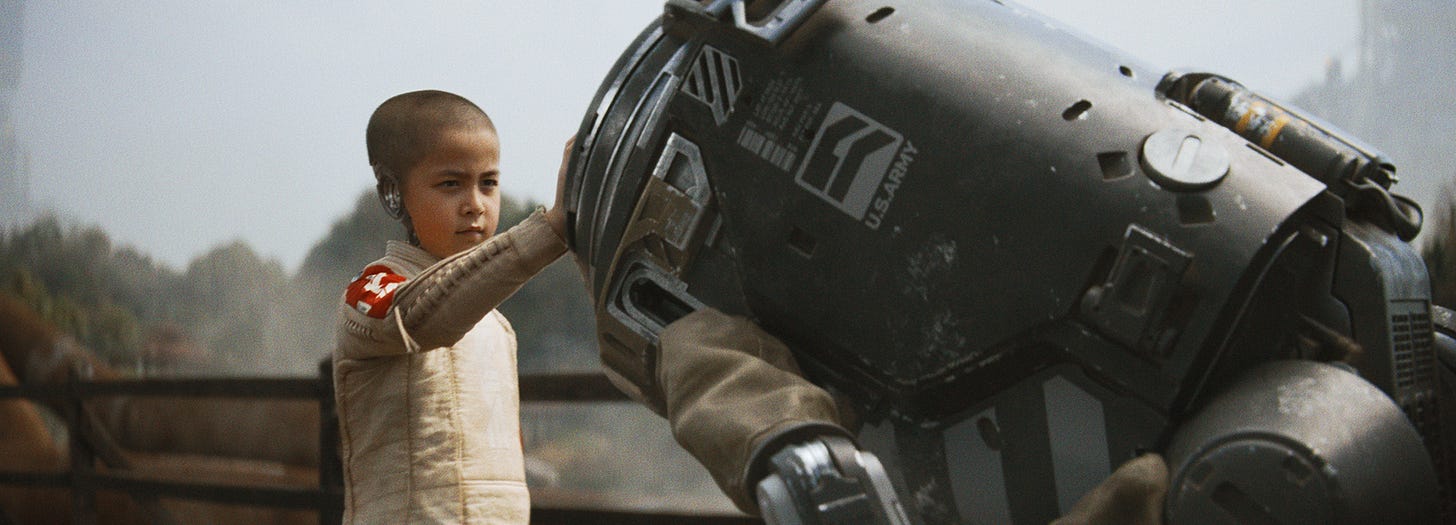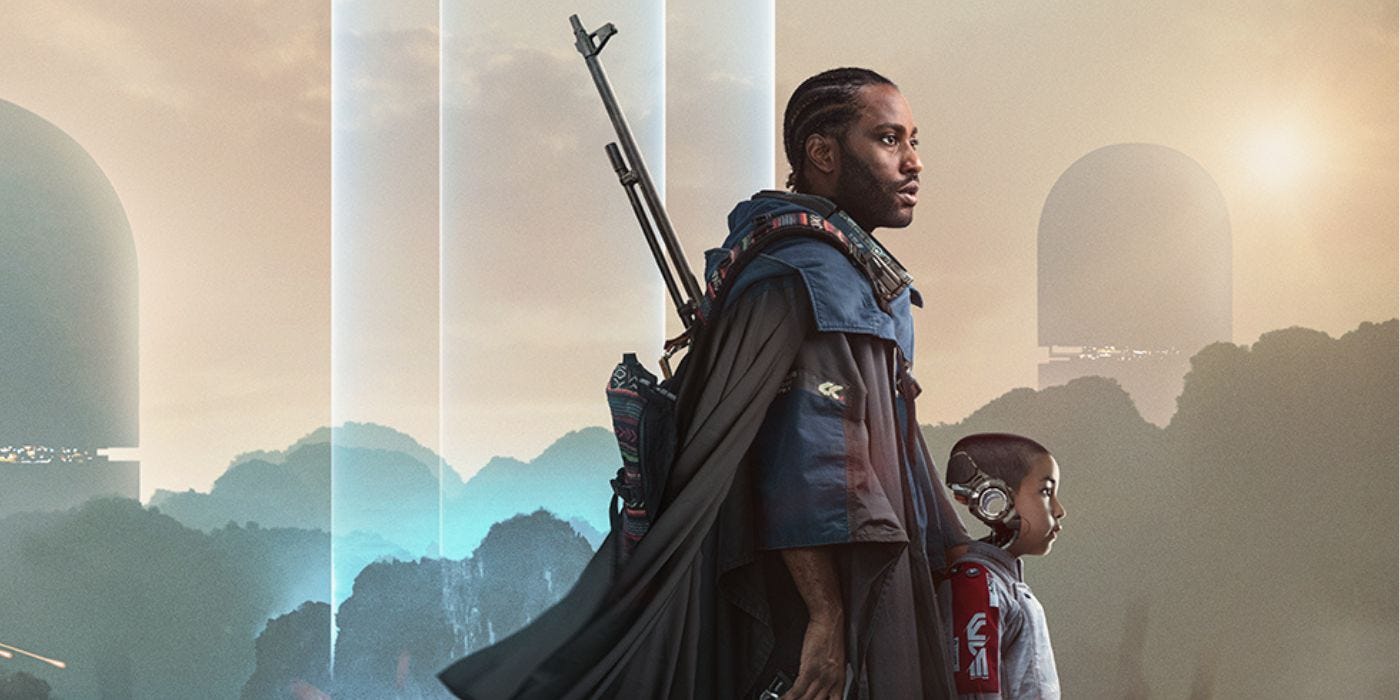The Creator shows us something "new"
Gareth Edwards tries to chart his own path while being absurdly derivative
On July 13th, 2023, the Screen Actors Guild went on strike against the Alliance of Motion Picture and Television Producers, the trade association that represents over 350 American television and film production companies. Members of this union are demanding their fair share of the profits that their hard work and dedication produces for these multinational media conglomerates and their overpaid CEOs.
There has been conflicting information on what does and does not count as crossing the picket line, and questions were raised if reviewing new films acted as promotion, a prohibited act under the strike rules. However, after reviewing all of the information available, movie reviews seem to be permissible for non-union members, and we’ve decided to continue reviewing new films in theaters and on streaming services as planned.
That being said, CineMancuso and The New Artist Workshop unequivocally stand with workers - above and below the line, striking or not, unionized or not - and we’re not going to remove this disclaimer from our reviews until the studios satisfy the union’s demands.
If you want to help the cause, post about it on social media, or donate to each union’s respective strike funds. Alone, we can’t do anything. Together, we can change everything.
They just don’t make ‘em like they used to - literally. I’m hardly the first to eulogize the mid-budget film, but Hollywood’s general abandonment of the format baffles me. For decades, feature film budgets could be neatly represented by a bell curve; some films were cheap, others were costly, but most fell somewhere in between. Resulting films were generally solid, their budgets giving filmmakers a sandbox just big enough to create something meaningful. Studio executives didn’t greenlight such films in the pursuit of artistic innovation or out of the kindness of their hearts; these films made modest profits, particularly off of their reasonable budgets. Audiences, filmmakers, and studios were all happy - the model was stable. But then came the blockbuster, giving studios, largely owned by conglomerate corporations, unholy amounts of cash and unsustainable expectations. Sure, star-studded romantic comedies and expertly written courtroom dramas turned a profit, but hundreds of millions of dollars worth? How about billions? By the 2020s, that beautifully balanced bell curve had been flipped upside down; you have your micro-budget features operating outside of the studio system, and you have your gargantuan blockbuster tentpoles holding up the entire industry. Even adjusted for inflation, nearly all of the 50 most expensive films ever made were produced this century. They’re too big to fail, so they almost always rely on pre-existing intellectual property to guarantee a minimum box office return. But then what happened to the mid-budget film, where audiences could expect decent quality from competent filmmakers? Those filmmakers either downsized their ambitions, sold out to the corporate machine, moved their efforts to television or streaming, retired, or died. With this context in mind, something like The Creator feels anathema to a system that rewards complacency and penalizes creative risk. But Gareth Edwards attempts to give audiences something new, an original science-fiction epic that tests the waters for an industry on the verge of seismic change.
To call this film original, however, feels misleading; while the world that Edwards and co-writer Chris Weitz have created is certainly new, the script itself feels utterly derivative. The film pulls (or perhaps does more than pull) from a host of references and inspirations, with films like Apocalypse Now, District 9, Avatar, Blade Runner, and even the original Star Wars constituting its DNA. George Lucas’ original space opera was also a pastiche, true, but his singular vision elevated the material to become more than the sum of its parts. Unfortunately, Edwards is not able to pull off the same cinematic feat, and there’s very little here that will surprise you on a narrative or thematic level. Characters feel stock, and their generic arcs check off boxes more than they stir emotions. But that aforementioned worldbuilding is one of the film’s critical strengths; while not especially revelatory, the film showcases a fascinating not-too-distant future that suggests some disturbing possibilities, such as robotics being used for crowd control and suicide bombers. The film could have extrapolated even more of today’s dysfunctions, and a better understanding of the world would have deepened our emotional connection to the narrative. It’s clear that Edwards wanted to make a longer film that explored its subject matter with more intention; the film stands at just over two hours, despite a reportedly five hour assembly cut. As a result, choppy editing moves us from scenario to scenario, rarely giving us the chance to appreciate what’s going on. Thematic concepts like political liberation and American imperialism are more so given lip service than actually explored in satisfying ways that add to the conversation.
But Edwards puts artificial intelligence at the heart of his film; as the real-world technology rapidly develops, so too do our anxieties about its society-altering potential. But because the film is so slavish to what has come before, it fails to really meet the moment in relevant ways. There have been plenty of films that have skipped over the creation of sentient robots and gone straight to their marginalization in society, using them as an analog to explore issues around civil rights and prejudice. Stories like these made sense when such technology was merely theoretical. But that’s not our issue with this technology; today’s artificial intelligence exacerbates pre-existing challenges, such as plagiarism, disinformation, and job replacement. ChatGPT is far from sentient, and its designation as “artificial intelligence” feels more of a marketing gimmick (like how we have “hoverboards” now). But Edwards doesn’t seem to have anything to add to this controversial conversation, framing the dignity of robots as the central issue here. Films of this nature are certainly entertaining, but The Creator hardly feels as relevant as it perhaps wants to be.
The film’s saving grace is its impressive visual effects; on a budget of “only” $80 million, Edwards brings this vision of the future to life with “dazzling images on a huge silver screen.” The filmmakers insisted on filming much of the film on location, as Edwards explains, “Our whole plan was just to go to the greatest locations in the world, because the cost of a flight is way less than the cost of building a set. We were going to hopscotch around the world and shoot this film, then layer in the science-fiction on top afterwards. If our film is trying to achieve something visually, it’s trying to feel real in terms of science-fiction." Consequently, the film feels incredibly tactile; computer-generated imagery is wonderfully integrated into the real world. For most modern blockbusters, visual effects often look worse than they did a decade ago due to VFX teams that are overstretched and understaffed. But great care and resources clearly went into this film’s visual presentation, supporting Edwards’ intended verisimilitude.
But that verisimilitude does not extend to its characters. Dialogue can feel stilted and unnatural, though I wonder how much of this is because of the writing or because of the delivery - probably a mixture of both. None of the actors here are phoning it in, but I never quite believe that any of them really live in this world. Usually such performances in VFX-heavy films are a result of filming largely in green screen voids, but considering most of this film was shot on-location, it’s disappointing to see them cosplay as these characters rather than really inhabiting them. John David Washington leads this effort, and…I’m sorry. Hollywood: stop trying to make John David Washington happen. It’s NOT going to happen. His charisma is serviceable, but he lacks the nuance and depth that made his father a once-in-a-generation talent. His relationship with Alfie, the young AI girl who holds the key to saving her kind, lacks chemistry, though with a bombastic score and absurdly entertaining climax, we can find it in ourselves to care just a little bit more than we probably ought to.
$80 million is by no means “mid-budget,” but considering that Christopher Nolan’s Oppenheimer was made for $100 million, The Creator is an impressive visual spectacle that gets points for forging its own path without the security of previously beloved source material. Unfortunately, the film is bogged down by derivative ideas, shallow characters, and a truncated runtime. But Hollywood always takes the wrong lessons from successes and failures; here, as the film seems to flounder at the box office, the narrative will be that audiences don’t want to see new stories with original characters. But that’s just simply not true. Gareth Edwards just doesn’t have the same pull that Christopher Nolan has, but the latter has shown that audiences will go where the quality is. As the industry continues to repair and rebuild following a costly pandemic and disruptive strikes, the balance of power may shift back to the heyday of American cinema - or lead somewhere new entirely.









